My son’s dogs.
Seemed a fitting portrait since I’ve already sketched my daughter’s dog and my other son’s cats.
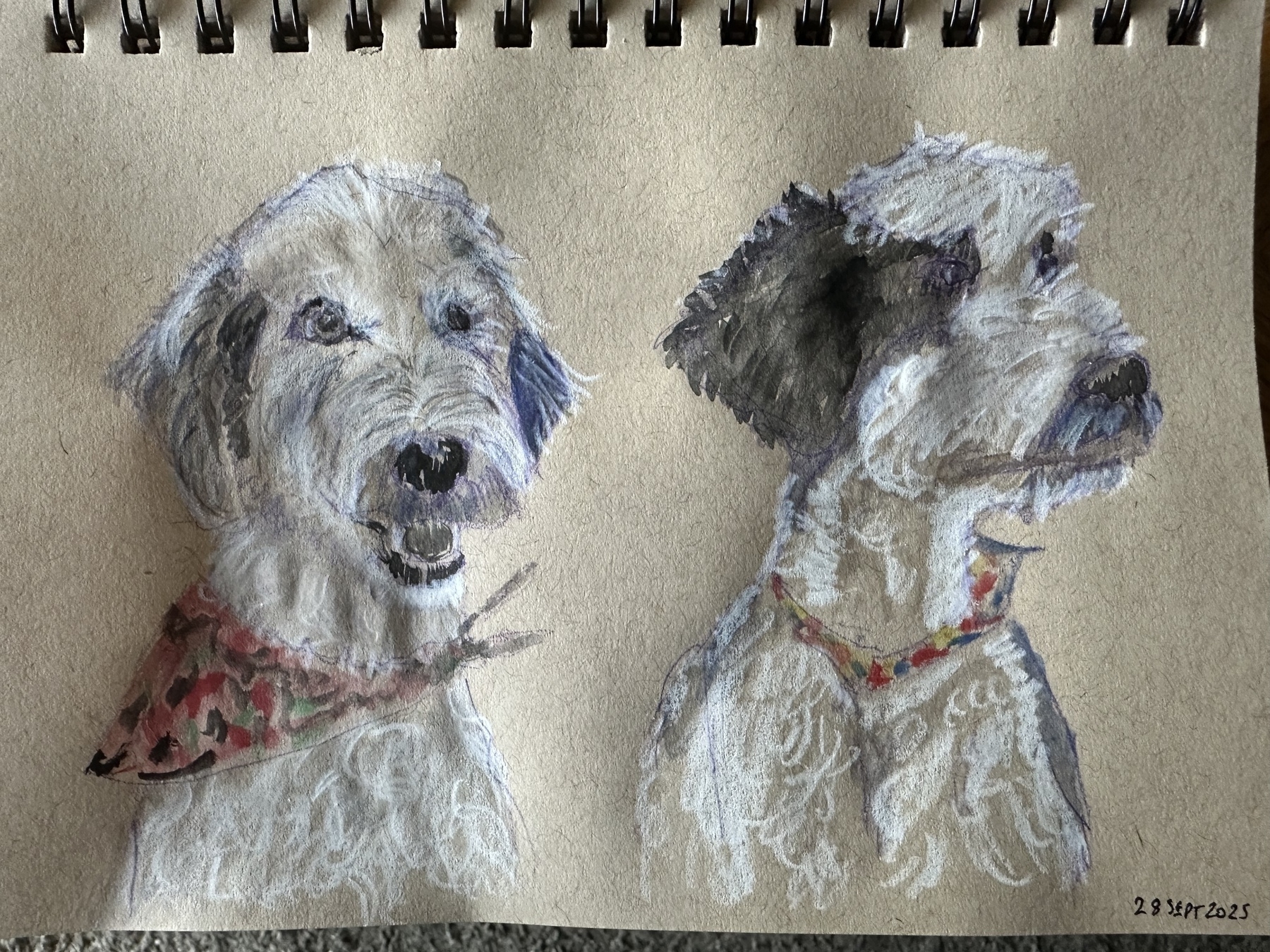
Wonder journaling: mussels and ladybugs
As my students work on their wonder journals, I’m working on mine as well.
One is about freshwater mussels. The other is about ladybugs.
The big idea: begin with a species people find fearful or disgusting, and try to elicit wonder.
Here are my first drafts, which I’ll share with my students this week.
I started my career as a philosophy and classics professor who specialized in ancient philosophy, philosophy of religion, philosophy of science, and American pragmatism.
One constant feature of studying and practicing religion is wonder. And one feature of studying and practicing pragmatism is curiosity and growth.
And so my career continues to grow, fueled by wonder.
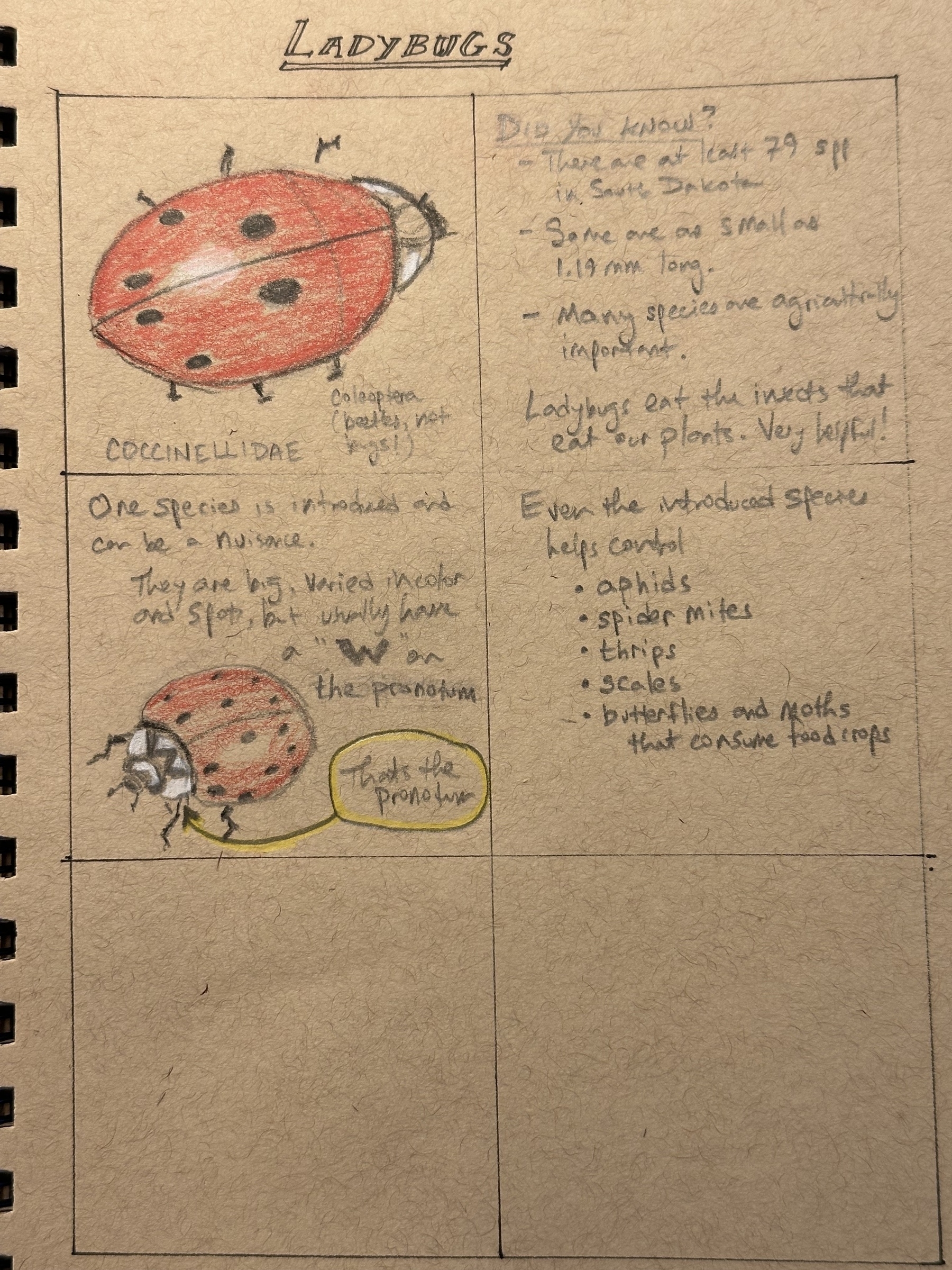
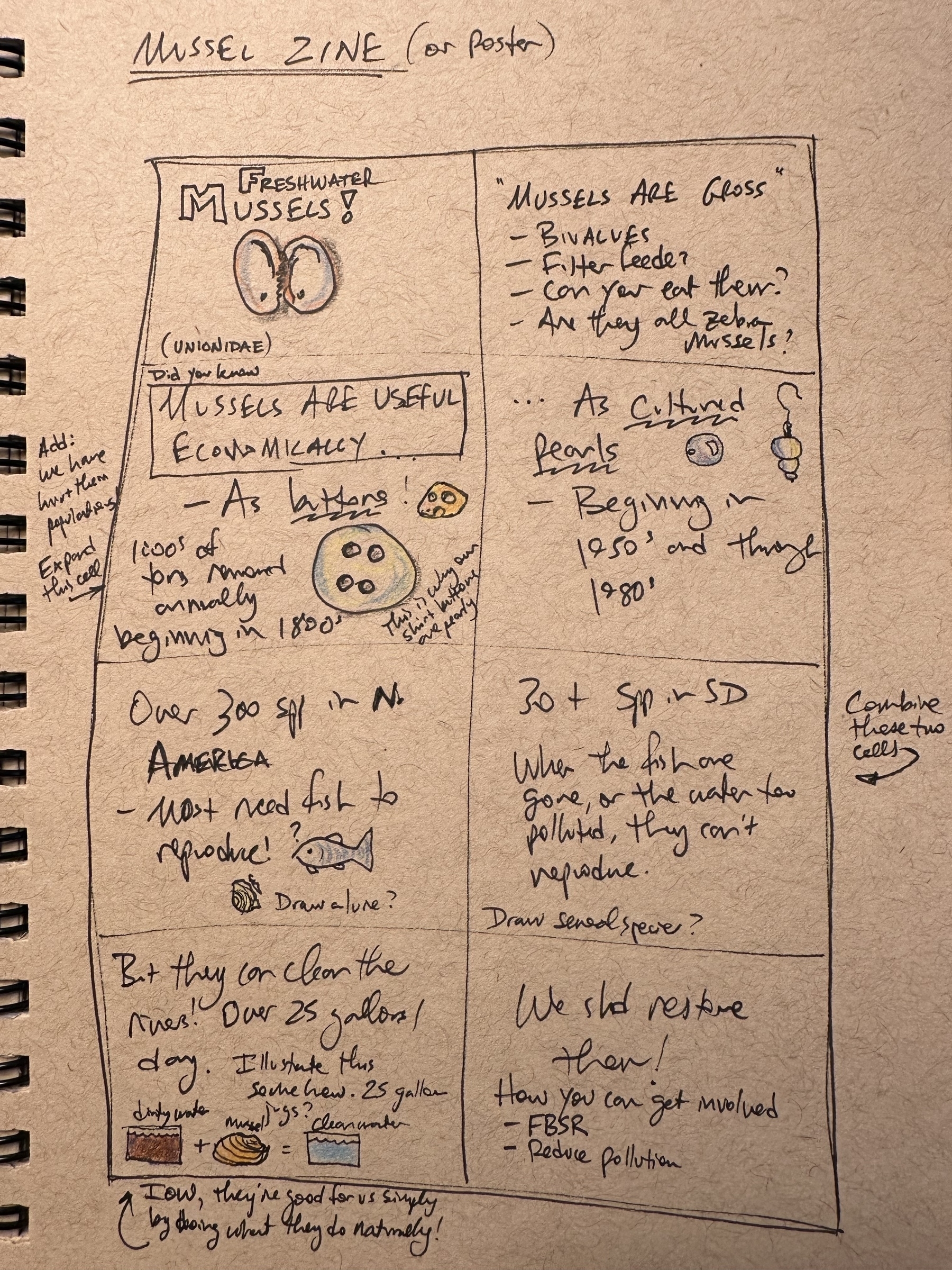
My son asked me to watch his cats while he is traveling so I sat and watched them and painted their portraits for an hour or two this morning. 😹🐈
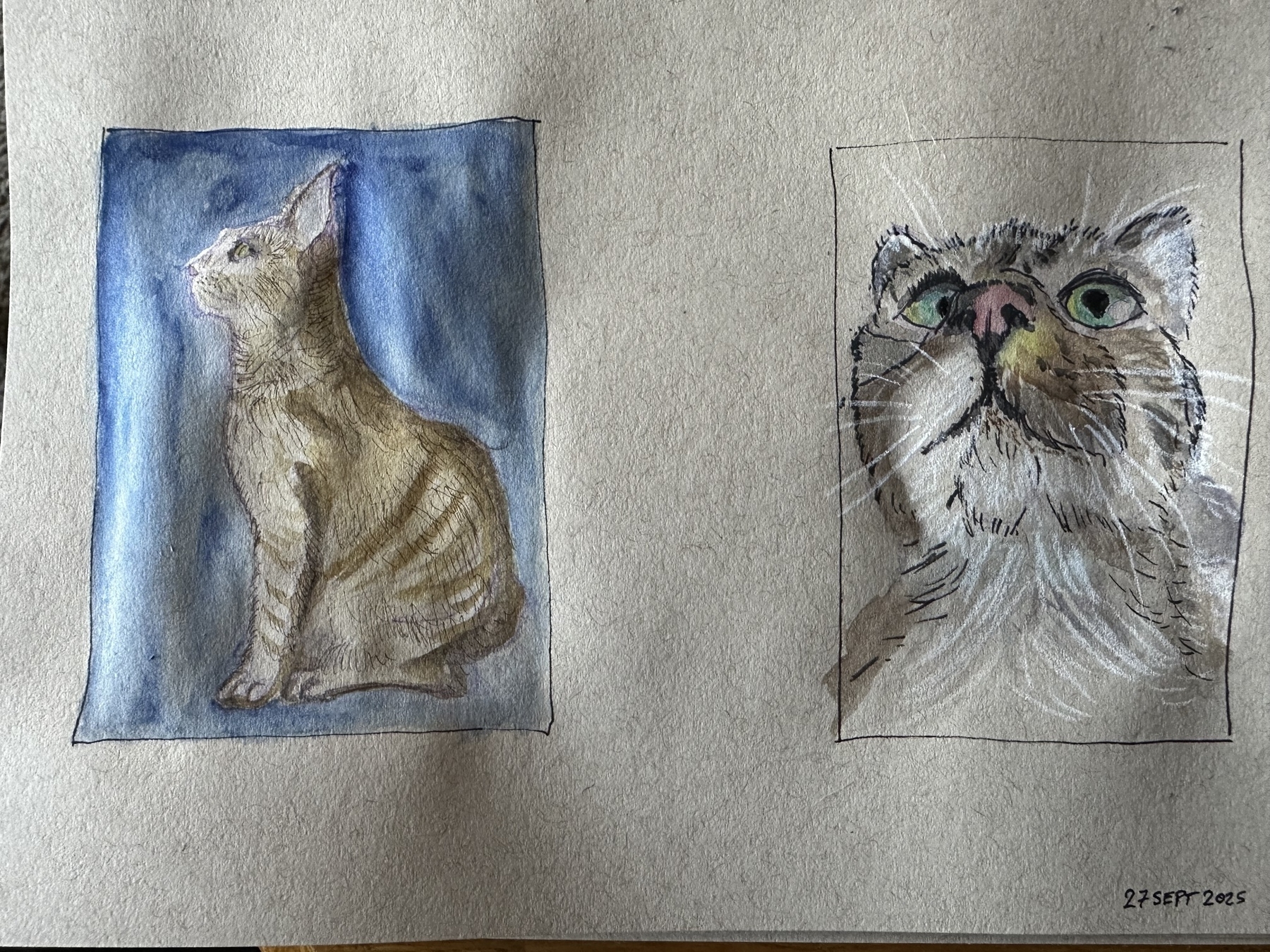
Late bloomers
I keep thinking I’m done seeing more butterflies then I come home and find three more species I haven’t seen all summer. Grass skipper, silver-spotted skipper, and pearl crescent. All hanging out in my new prairie perennial garden with late-blooming flower gold and purple flowers. These flowers are buzzing with native bees, too.
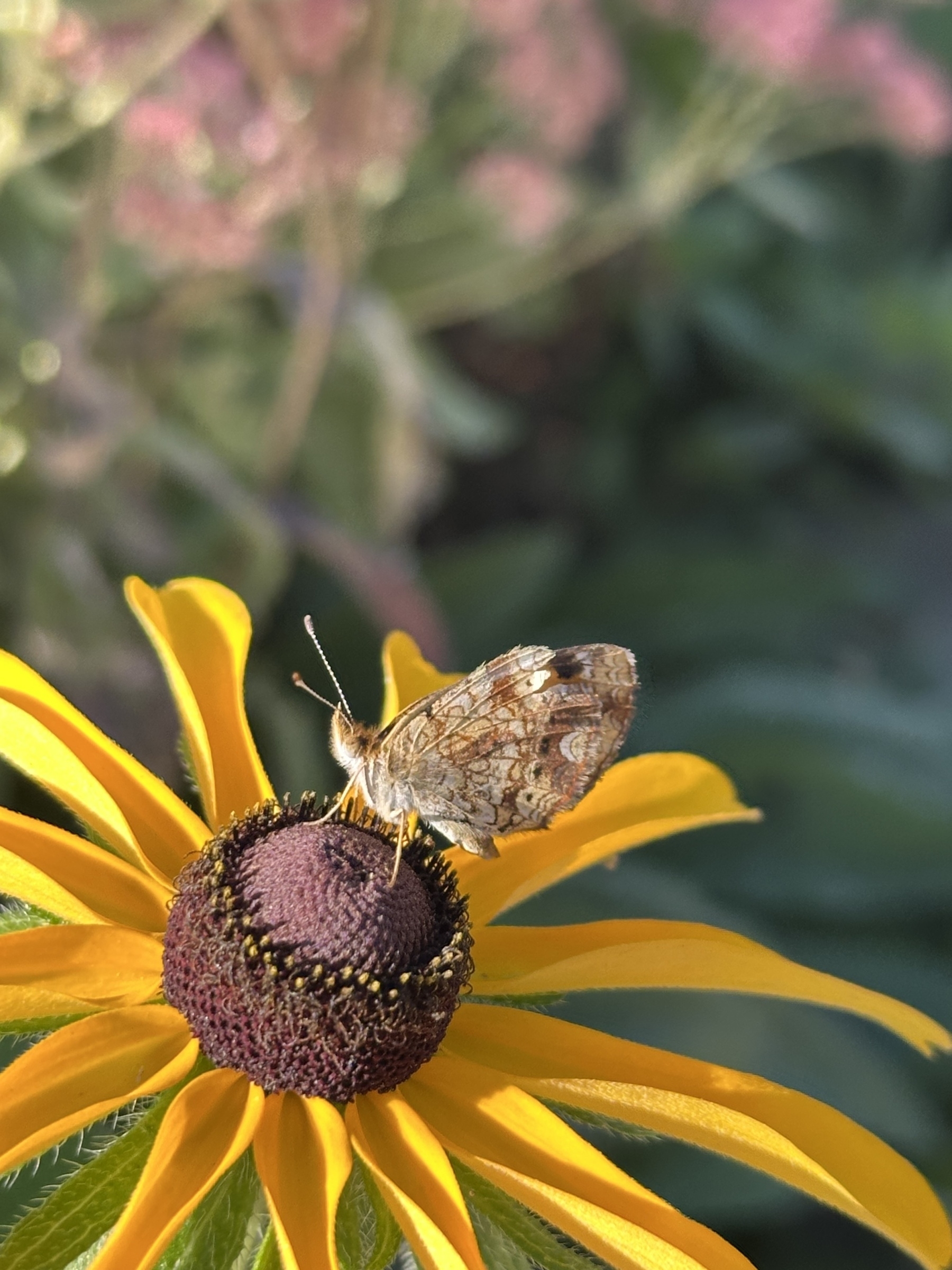
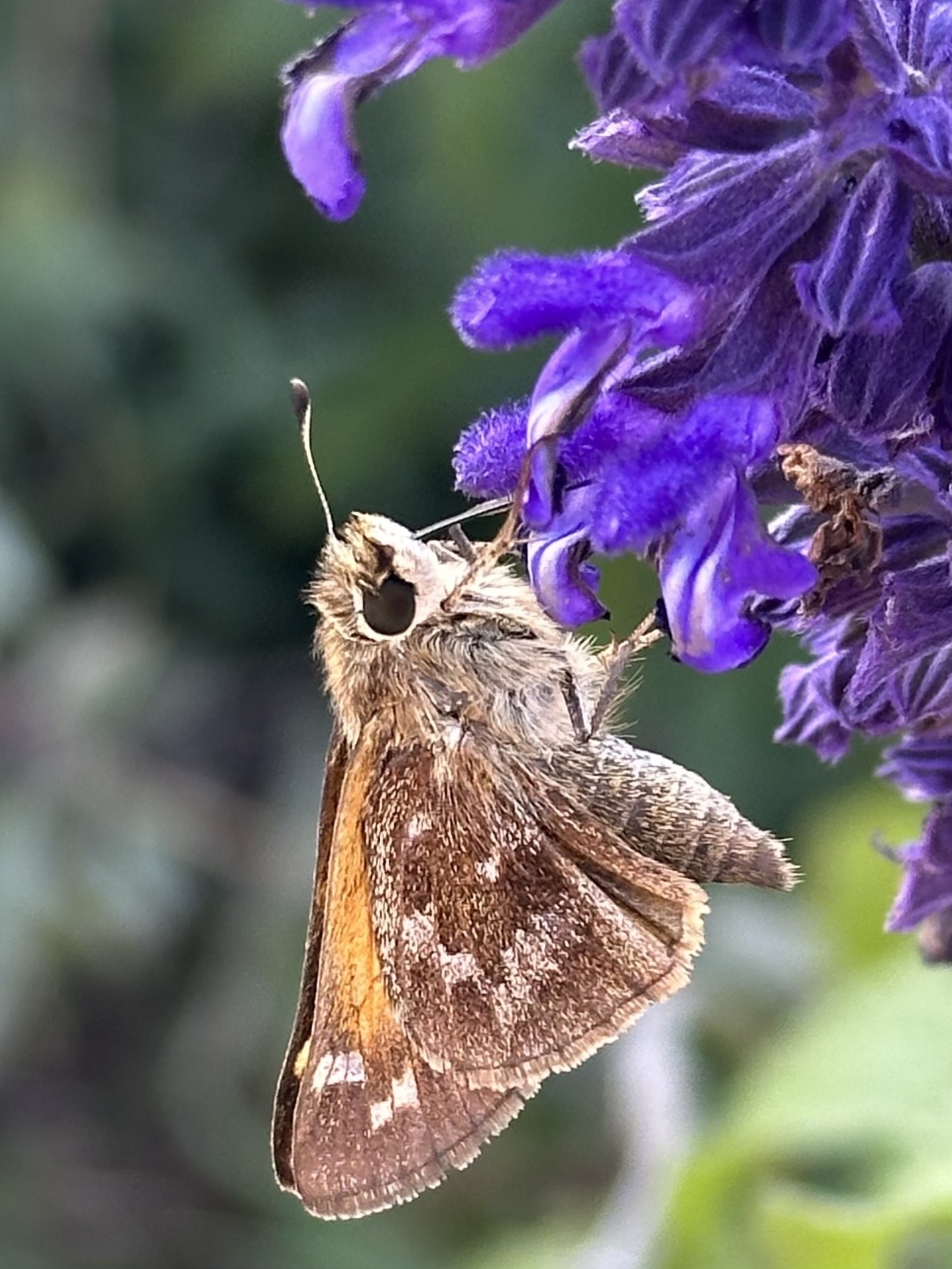
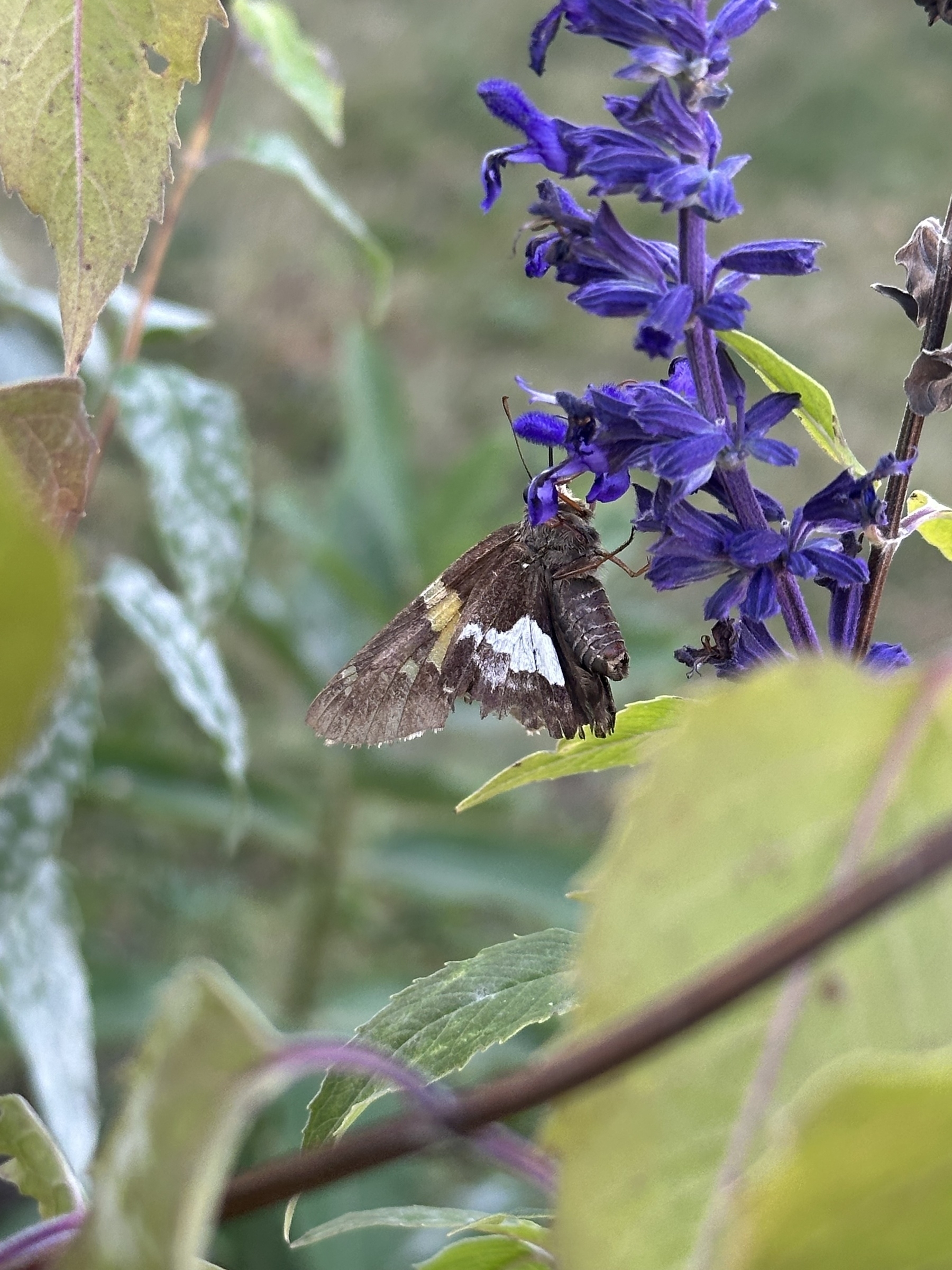
More lady beetles
One more photo, for comparison. This shows an introduced Asian lady beetle (left) next to a native lady beetle (right, maybe one of the hyperaspis species, but hard to tell from this photo). The native beetle could rest on one of the spots on the elytra of the other.
I’ve been looking for some of the small native species for a couple of years. This week the elms on campus have attracted loads of large lady beetles, which gave me the idea to look for the little ones on the same trees. Success!
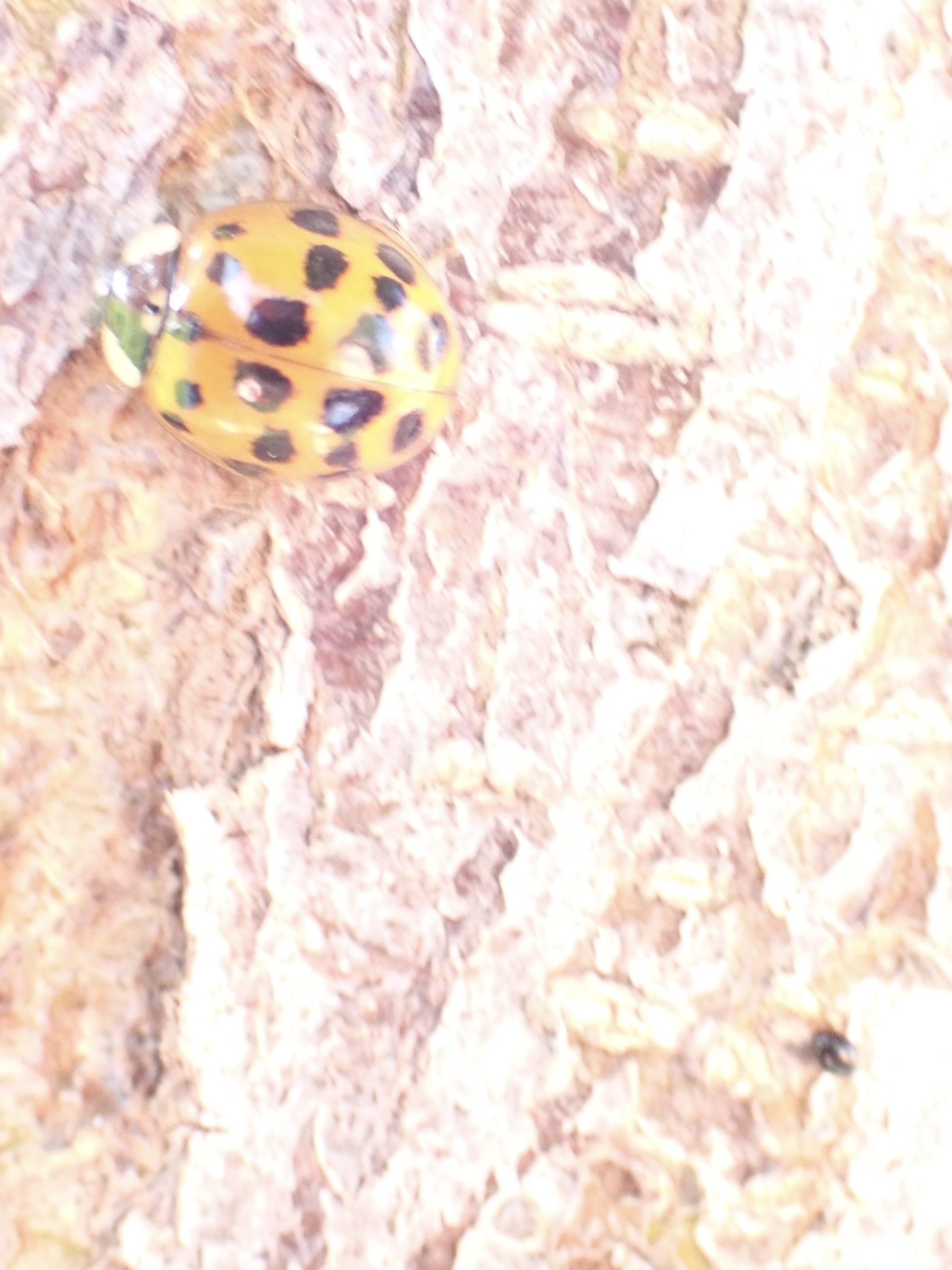
Lady Beetle
Update to my Lady Beetles post: today I brought a better macro lens and got a photo of one of the very small ones. I’ve never noticed the tiny lady beetles before because they’re so small they’re easy to miss or to dismiss as a bit of dirt or dust. This one is about 2mm long. Not sure about the species but I think I’ve got it down to four or five possibilities. My students and I found a few others with slightly different color, size, and shape, but all too small to tell what species without getting them under my microscope and I’m happy to let them live free and wild instead.

Fear Journals and Wonder Journals
This fall I have asked my Environmental Philosoohy students to make fear/wonder journals.
The big idea:
(1) start with a “fear journal” by doing research about some species that you either fear or find gross. Journal and sketch until you find something lovely in it.
(2) Bring your sketchbook with you around campus and stop regularly to sketch something small you see - at least 15 sketches over the course of the semester.
They’re not graded on artistic skill (who am I to judge that!) but on their engagement with the exercise. Get to know the small lives on campus, ideally by slowing down and paying close attention. This part is about shifting from fear to wonder, and I take a leaf from John Muir Laws, asking students to both sketch and to observe in words and numbers. Notice details, make comparisons, write down the questions that arise.
(3) Together we will choose a few species and make something like a zine or some other educational material to share what we have learned with others.
So over the course of the term we begin with fear and then move to wonder (Aristotle says “the love of wisdom begins in wonder”) and from there we look to share the wonder we have found.
You might give it a try as well. If you do, I’d love to hear what you learn.
Rapture in the Garden
If there is to be a rapture or a second coming, I’d like Christ to find me at work in the garden, caring for what grows there; or in the classroom or lab, caring for my students and what grows in their lives; or holding my wife and children and grandchildren, not worried about the end of the world but living today as though I cared about those who will live tomorrow.
I’ve written a bit about that before. You can search this blog for “religion” and “garden” or you can just click here for a slightly longer reflection on this theme, with photos from my garden: davoh.org/2016/10/1…
Five Points
Experimenting with perspective and five vanishing points.
Lately I’ve wished I studied art in school, but even from an early age I got the impression that art classes were for the artistically talented rather than for those who might benefit from some instruction.
Here’s another shameless sketch being posted into the void as a way of keeping myself accountable as I urge my students to add sketches to their own notes.
The scene is my home office with its jumble of whiteboards and bookshelves. I am seated in the corner rocking chair as I sketch.
One benefit of posting these things is that all the social media now assume I want to see other sketchers, which is far better than the pablum they usually offer.
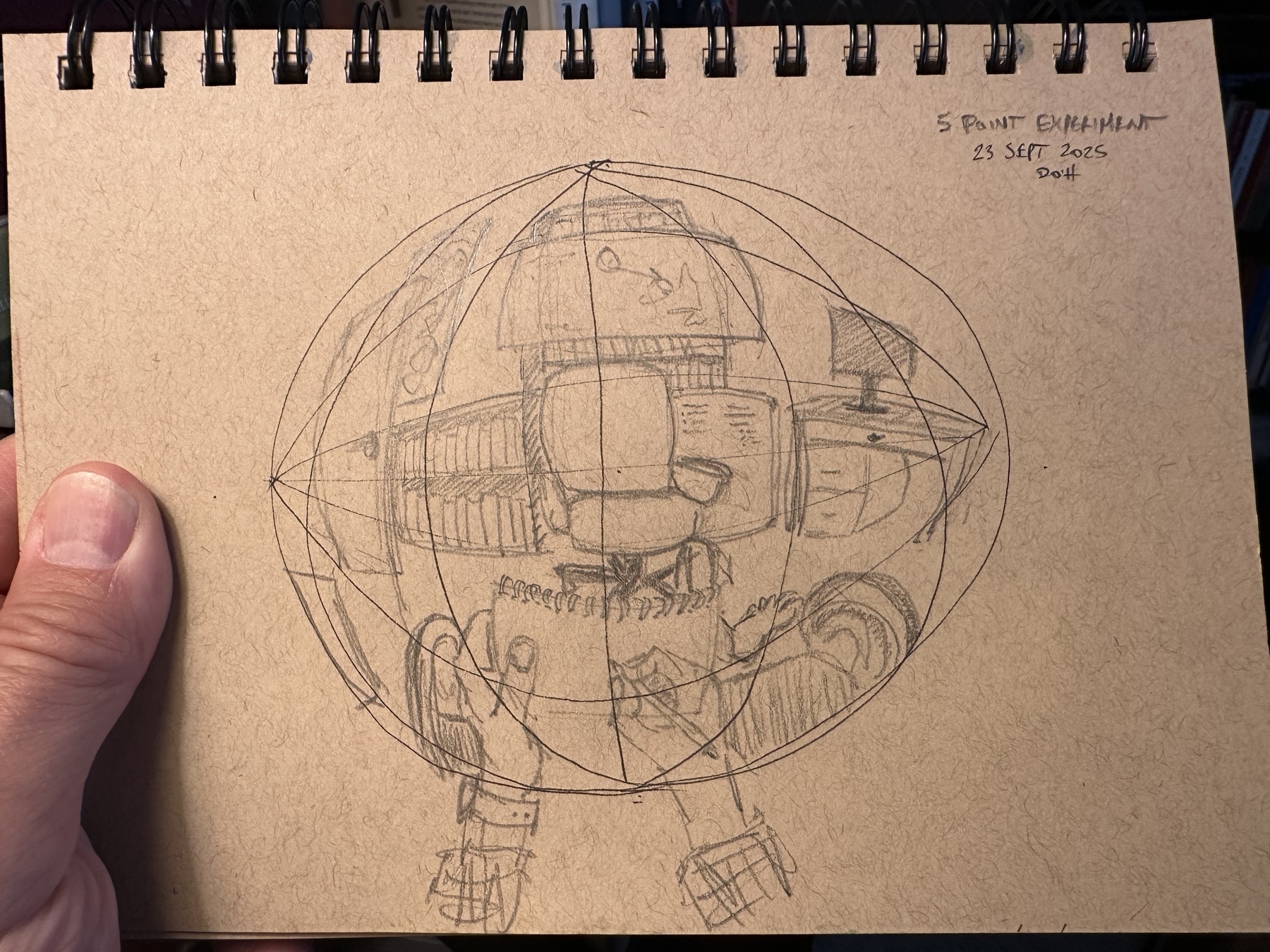
Wonder Journal: agapostemon bee 🐝
Yesterday’s wonder journal sketch of an agapostemon bee. This was a good casual exercise at the end of the day. I don’t worry about getting all the details right. Instead, I try to get a little more right than I did in my last sketch. The improvement comes through repetition, continued practice, and not feeling shame at imperfection. I embrace the imperfection because it’s far better than every sketch that I don’t even begin.
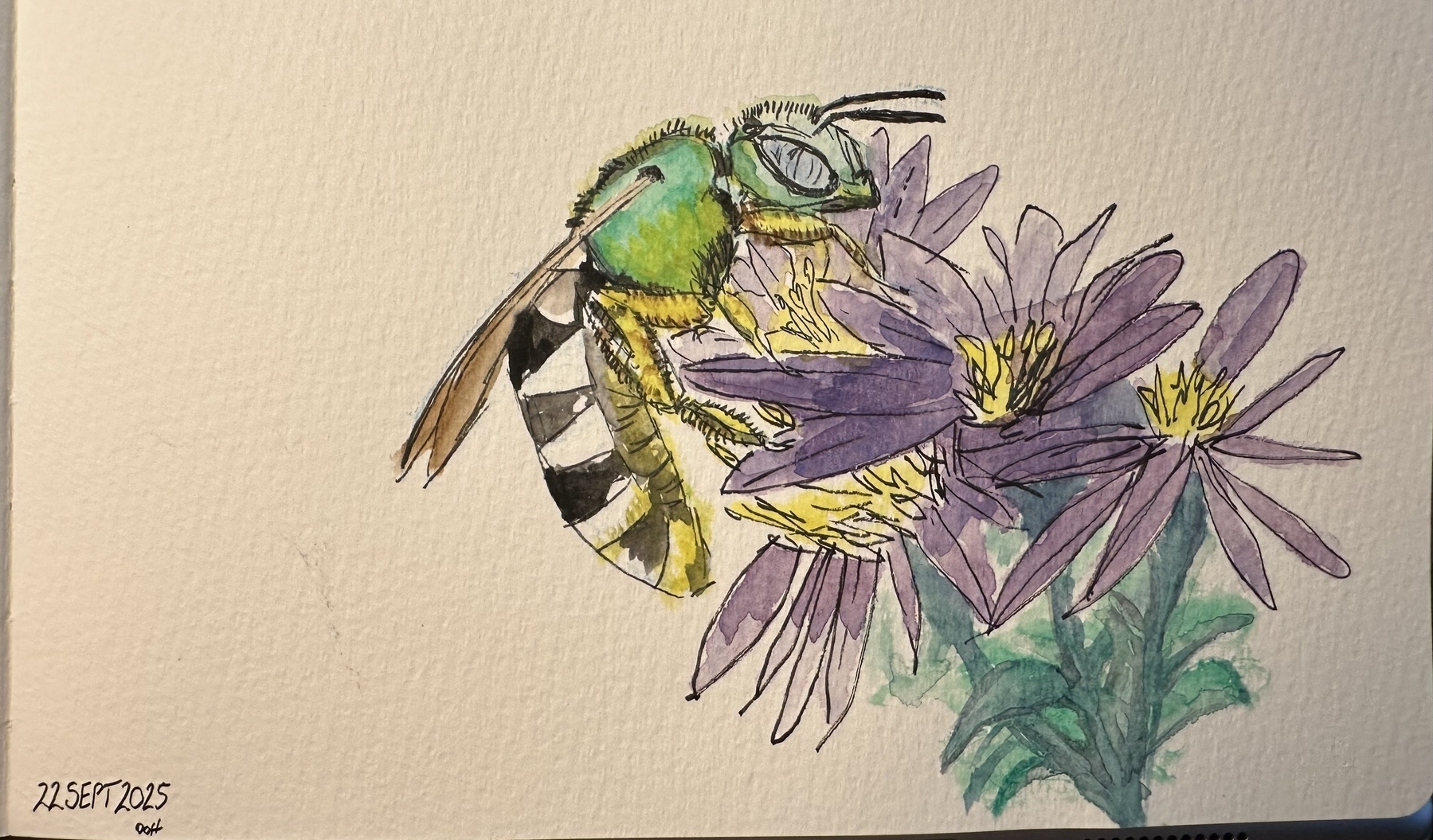
Today’s Insects 🦋🐝
A few more insects from this morning’s run at the state park and from my quick perusal of my gardens.
An Eastern Tailed Blue, (cupido comyntas) one of the Lycaenid butterflies, is about the size of my fingernail, or about 1cm in length. I see more lycaenids where clover grows, fewer where lawns are poisoned to make them uniform with non-native golf course grass. They’re among my favorite insects. I included two photos of the same butterfly to give a sense of scale in comparison with my fingernail, and also to show the differences of coloration between the ventral and dorsal sides of the wing.
An Eastern Comma butterfly, (Polygonia comma), one of the Nymphalidae. I don’t see many of them except at this time of year, and even then I only see a few at this latitude, though I’ve seen more, and more of their near relatives, further north. Today I saw surprisingly many.
An Augochloropsis, or metallic green sweat bee, one of the halictidae. These are solitary bees, as are most of the roughly 4000 species of bees native to North America. Most bees want nothing to do with us and will fly away if you approach to take a photo. These are considerably smaller than honeybees, roughly 1cm long. Despite their bright metallic green coloration, they hide in plain sight and are easy to miss.
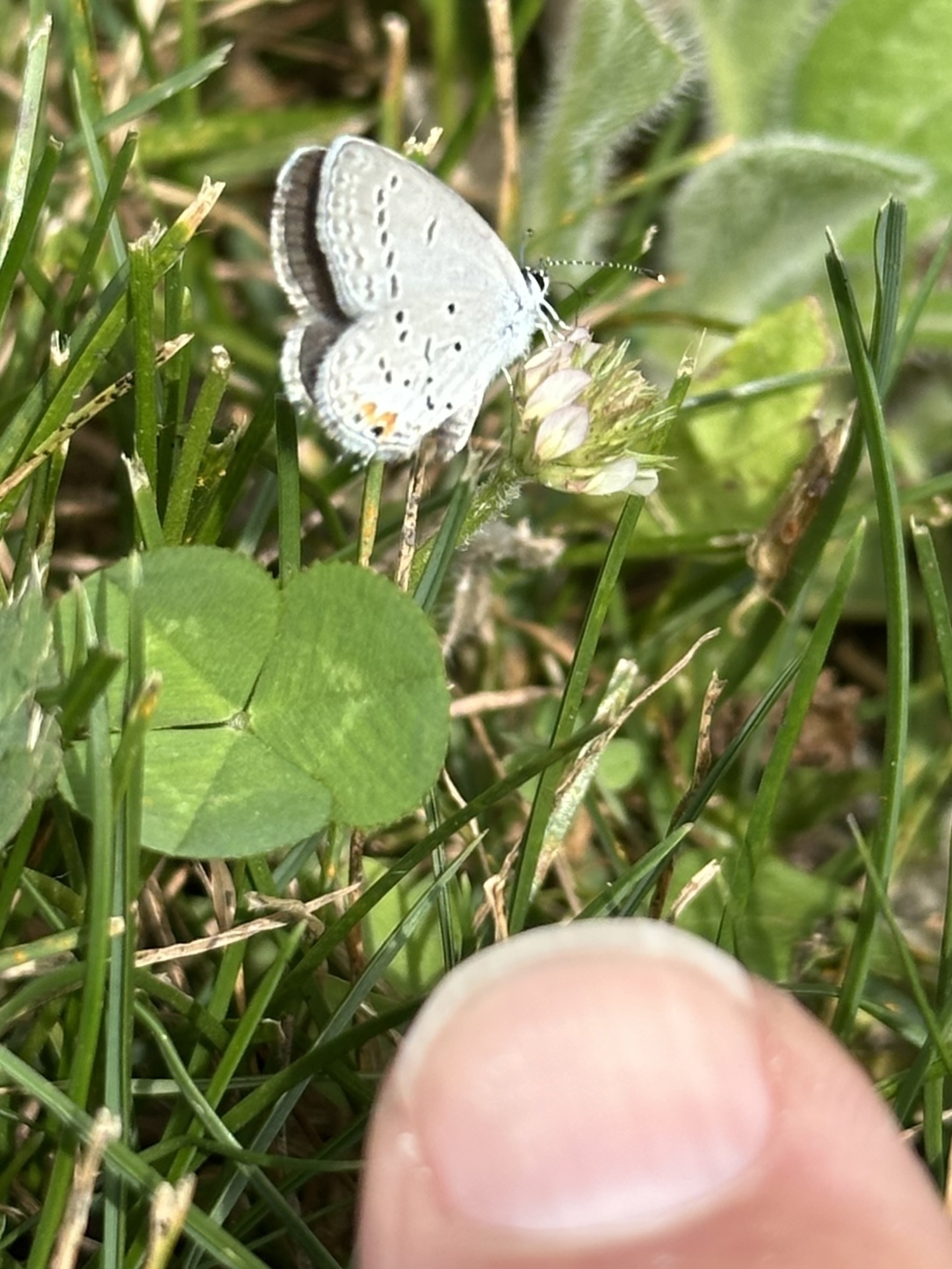
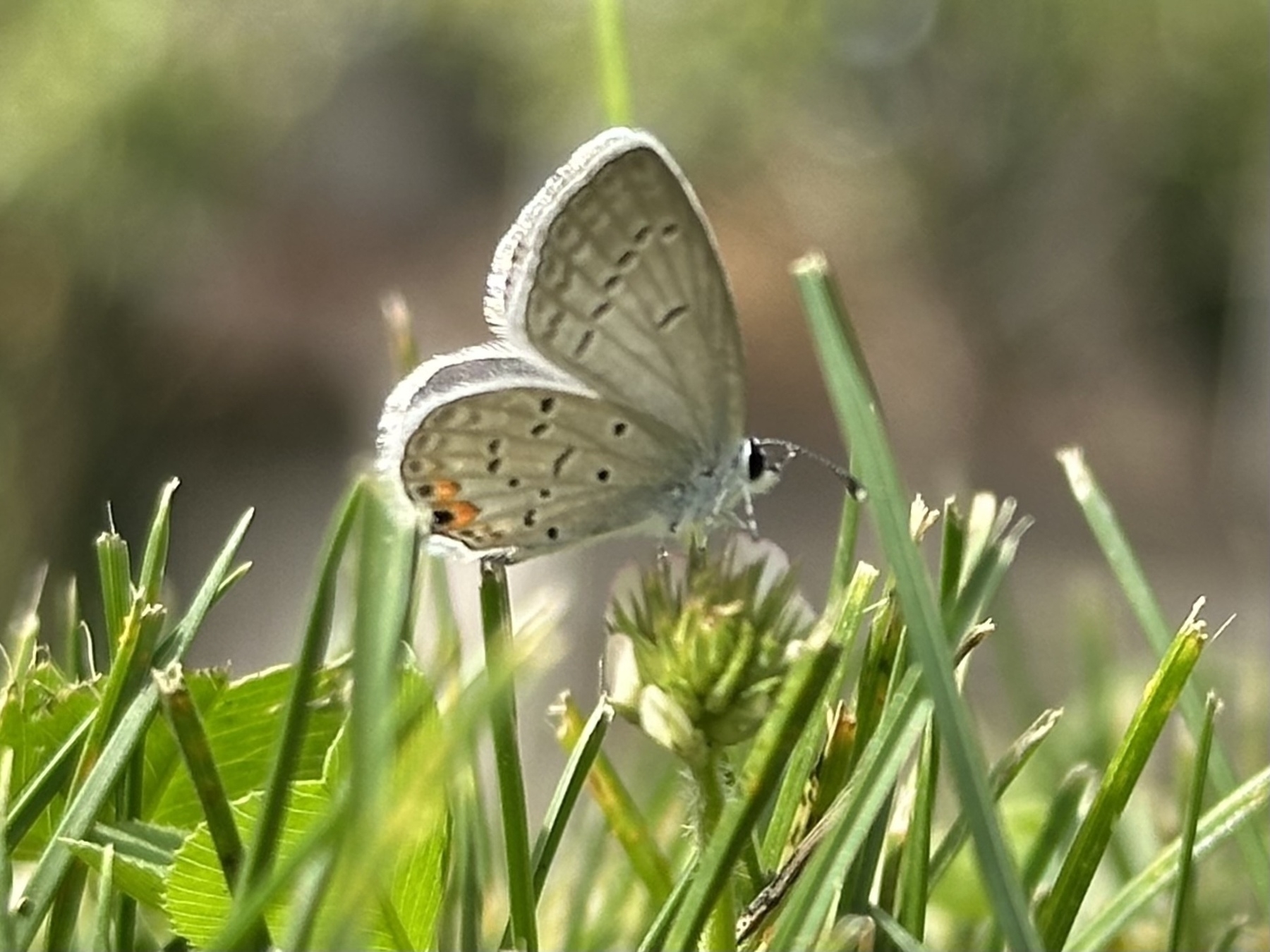
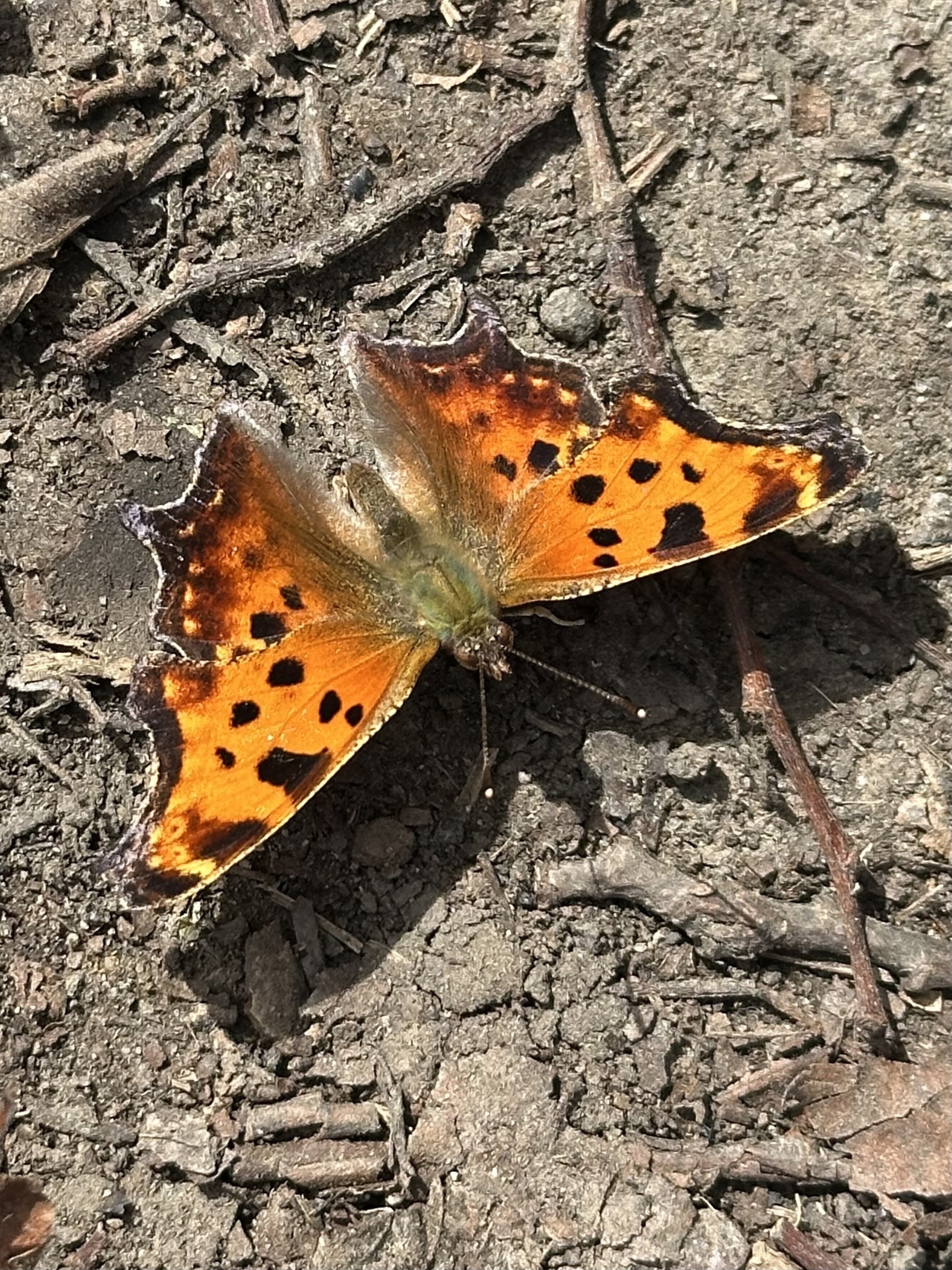
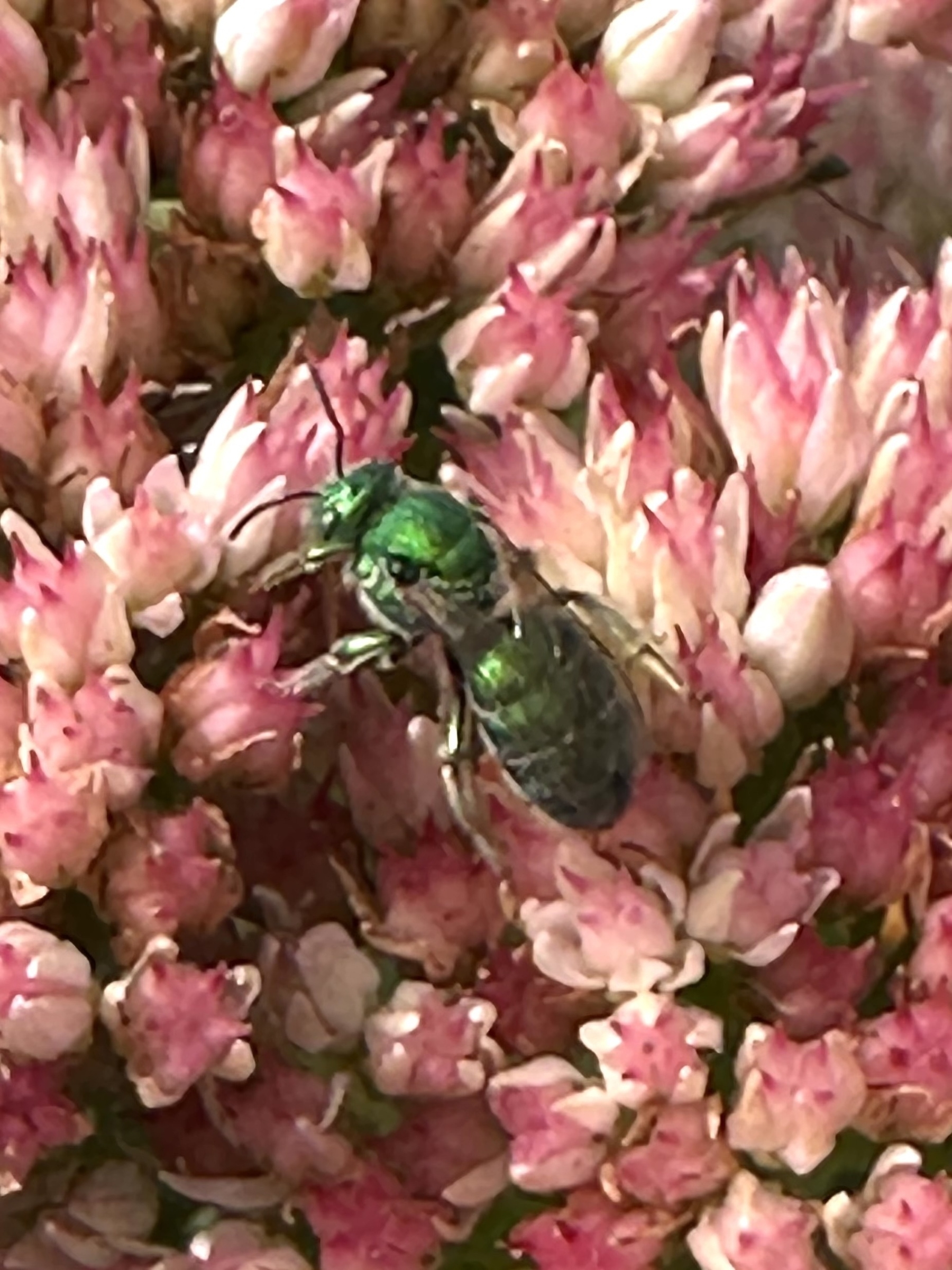
Agapostemon bee on aster.
This is a wonderful time of year, when the asters put out their brightly-colored targets for bees to land on, and the halictid and other small bees feast on the colorful blossoms.
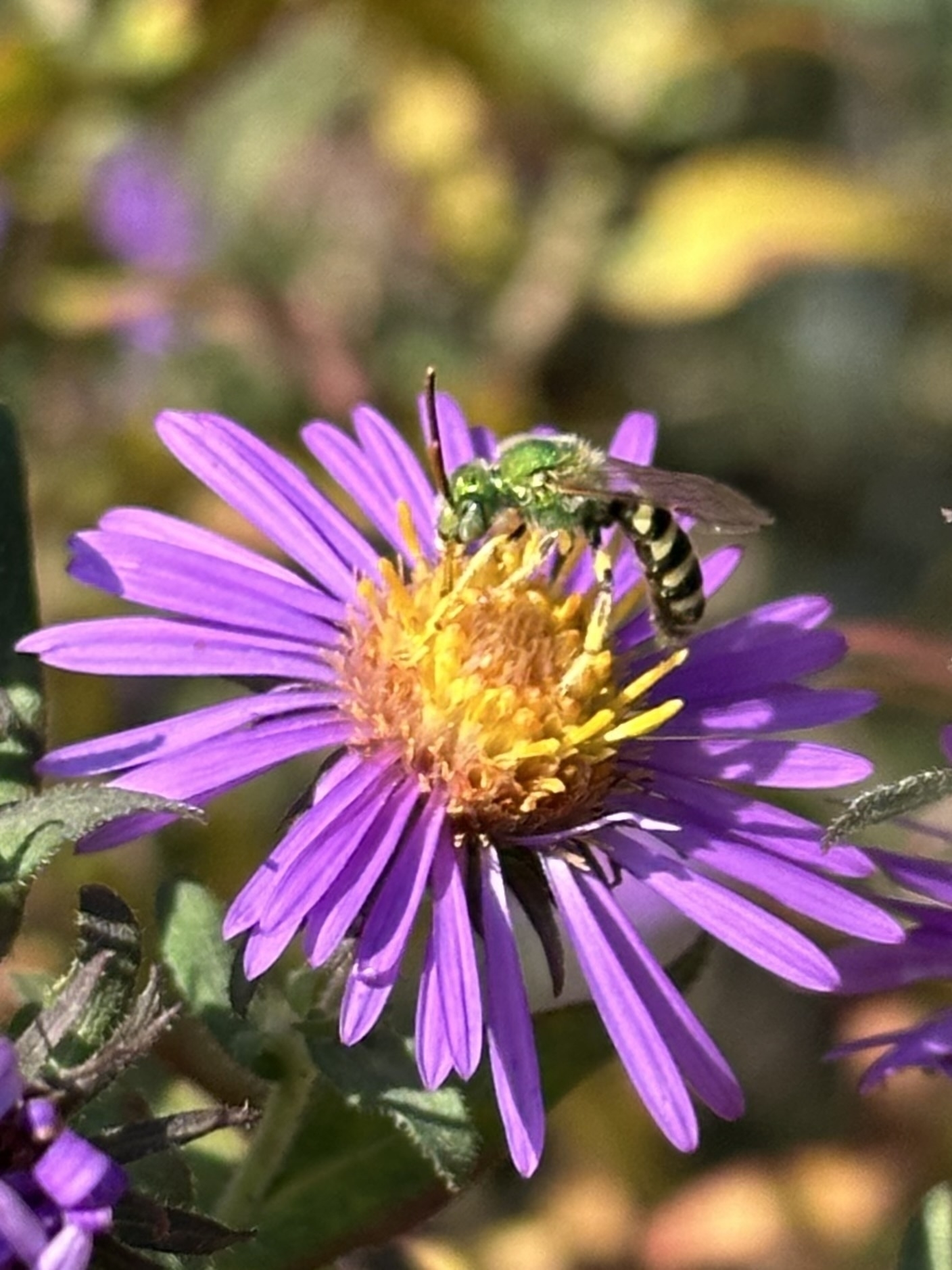
Lady beetles
Lady beetles on campus today. Came across two Siberian elm trees (I think that’s what they are but not completely sure) that were hosting a lady beetle party. Most were Asian lady beetles, which have become very common around here. A few were convergent lady beetles. And I saw two beetles that were maybe 1mm long and very dark. They might be native lady beetles as well since we have several species of lady beetles that are just over 1mm in length. (Microweisea misella, for instance, or a few Scymnus species). Sadly, I did not have my good camera with me so I couldn’t get a good closeup. I did look with a hand lens, but that didn’t help much with species ID. Anyway, you can see one of the small ones next to my fingertip in the photo here. The larger ones were feasting on aphids that were waking down the trunk. I could not see what the smaller ones were eating. It made for a nice stop though, and a few people came over to watch with me. Some small ants (Tetramorium, maybe?) were also patrolling the tree and the lady beetles seemed to ignore them. I also saw some invertebrates so small my hand lens couldn’t magnify them enough for me to even identify the family. Lots of life on those two trees!
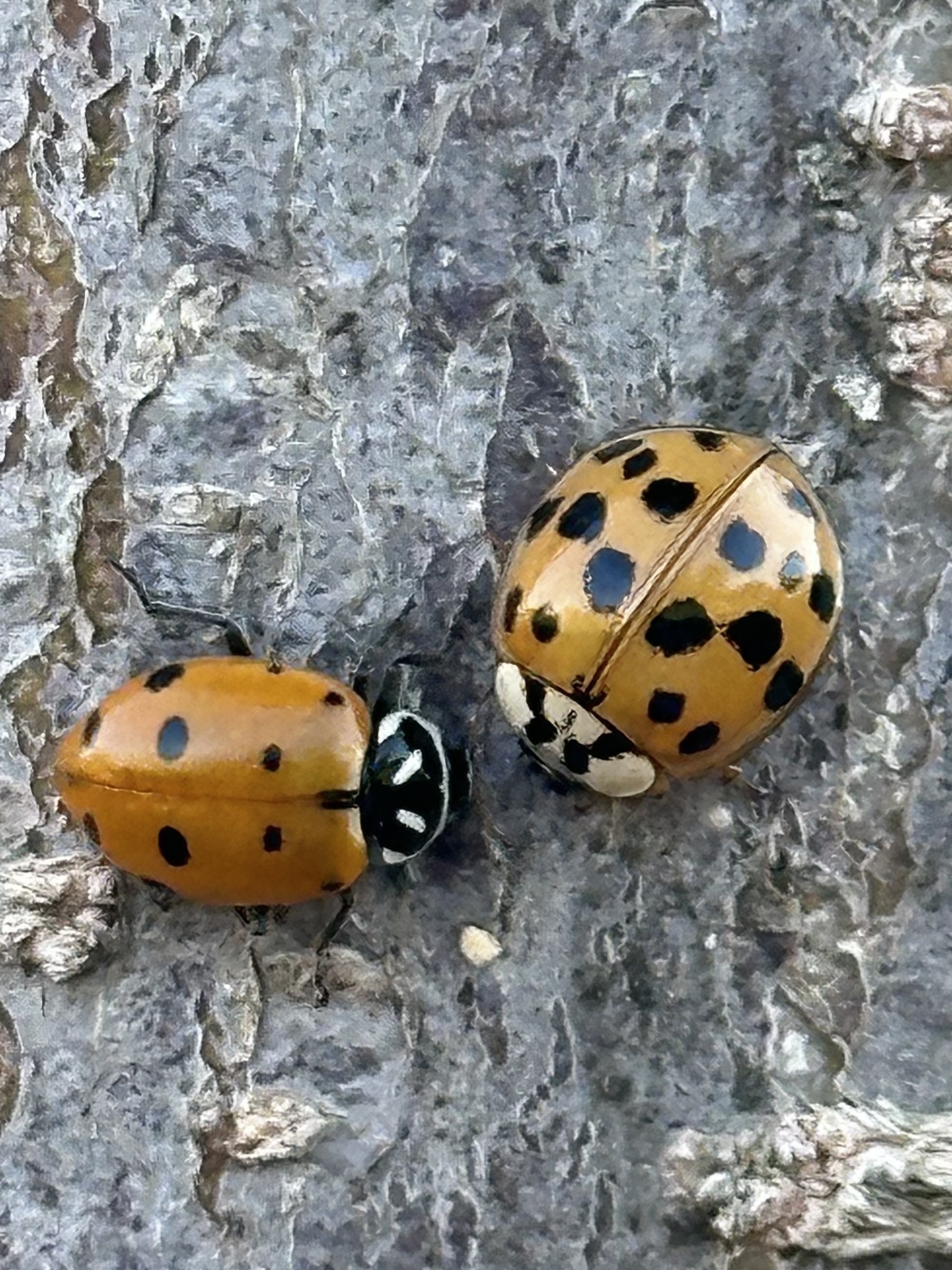
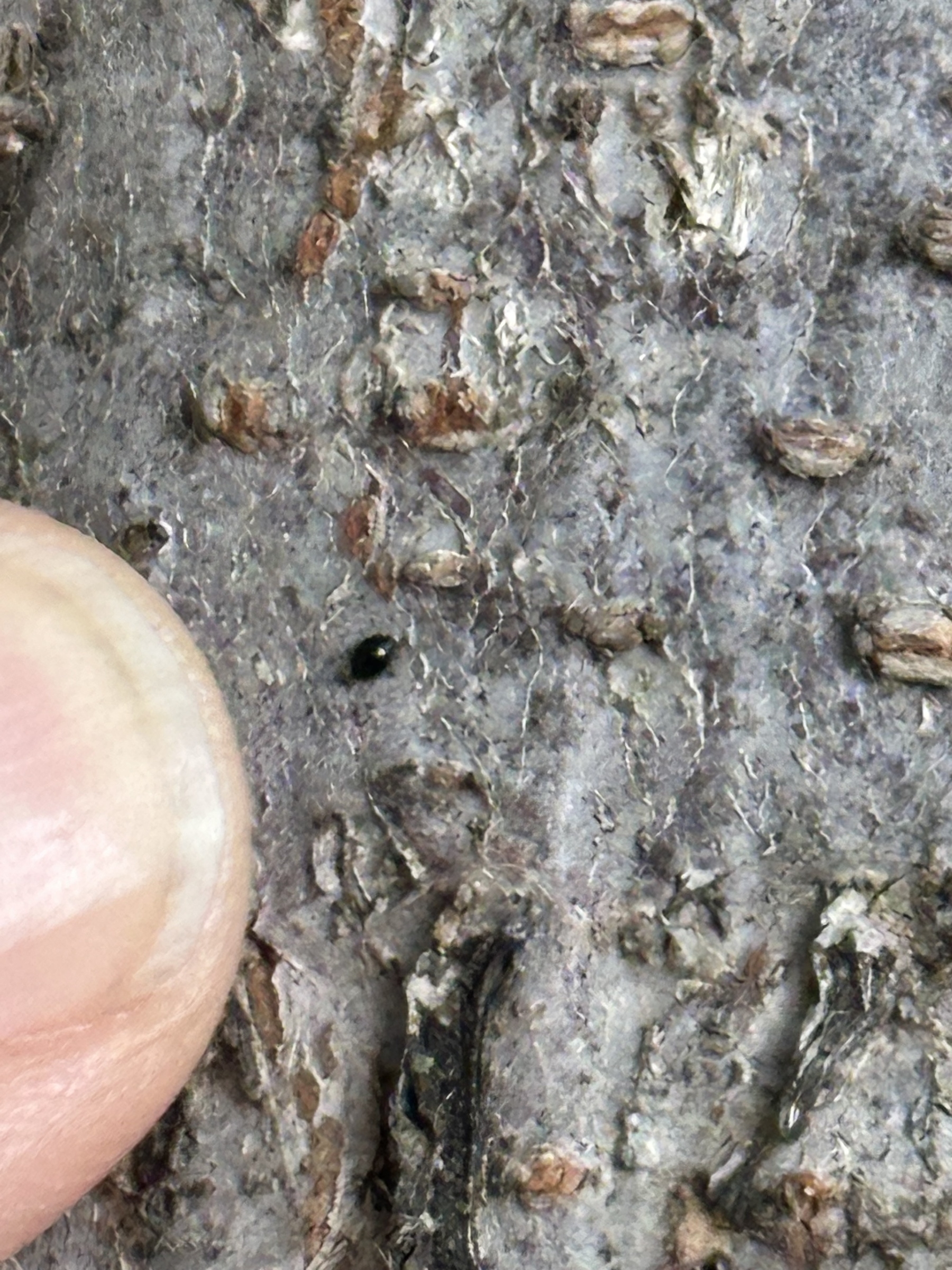
Sitting in the garden, coffee in the shade, the birds singing, the low hum of bees abuzz, the Wild Four O’Clocks continuing to bloom, a hundred small butterflies and beetles feasting on sunflowers.
Cutting down the cattails
This week my environmental philosophy class (which meets outdoors) has been studying the campus pond and its connection to the river. While I was teaching today the students pointed out that workers were cutting down the cattails. This happened as we were talking about the benefits of cattails! So after class I stayed and did a quick painting of the scene.
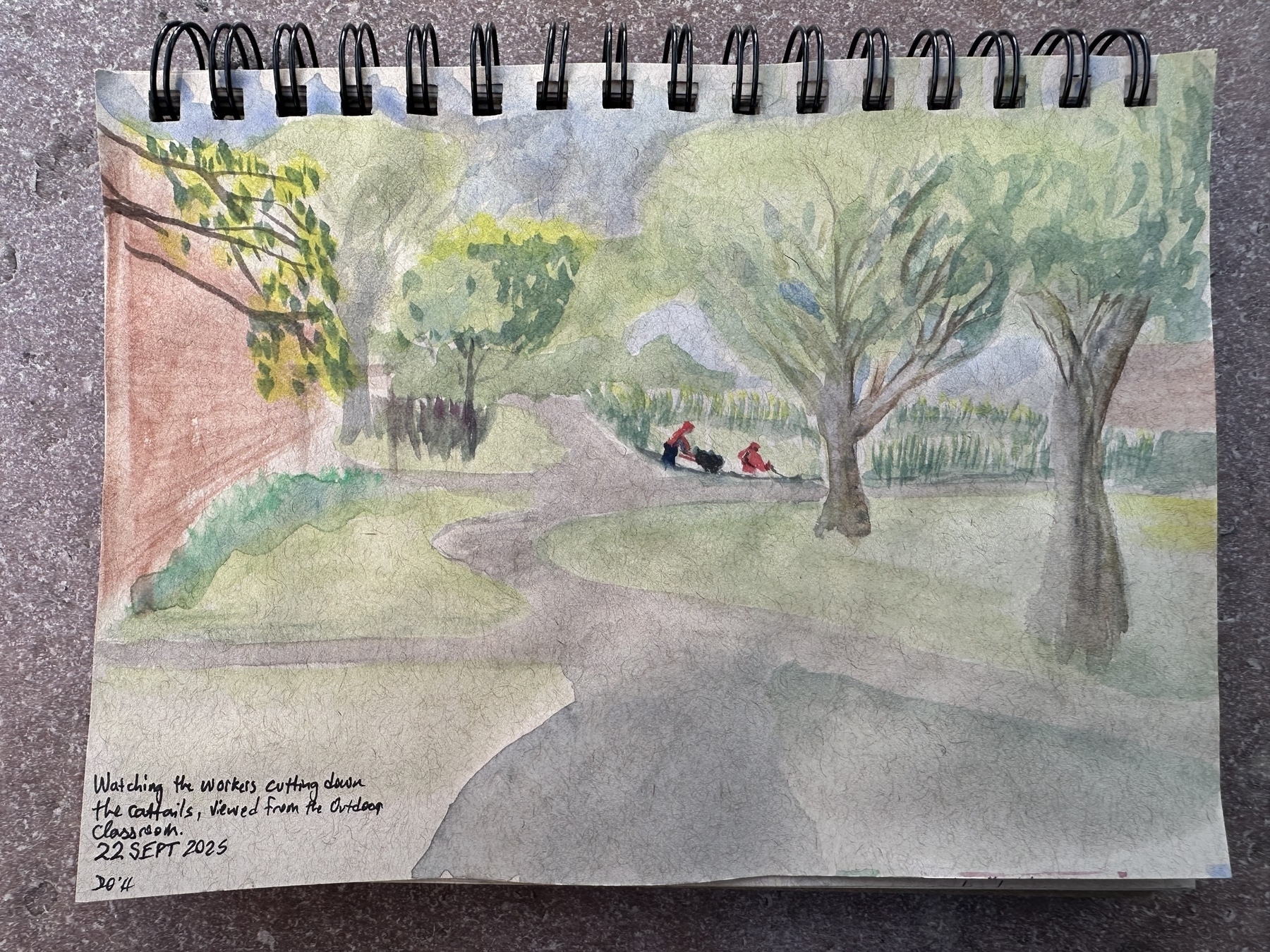
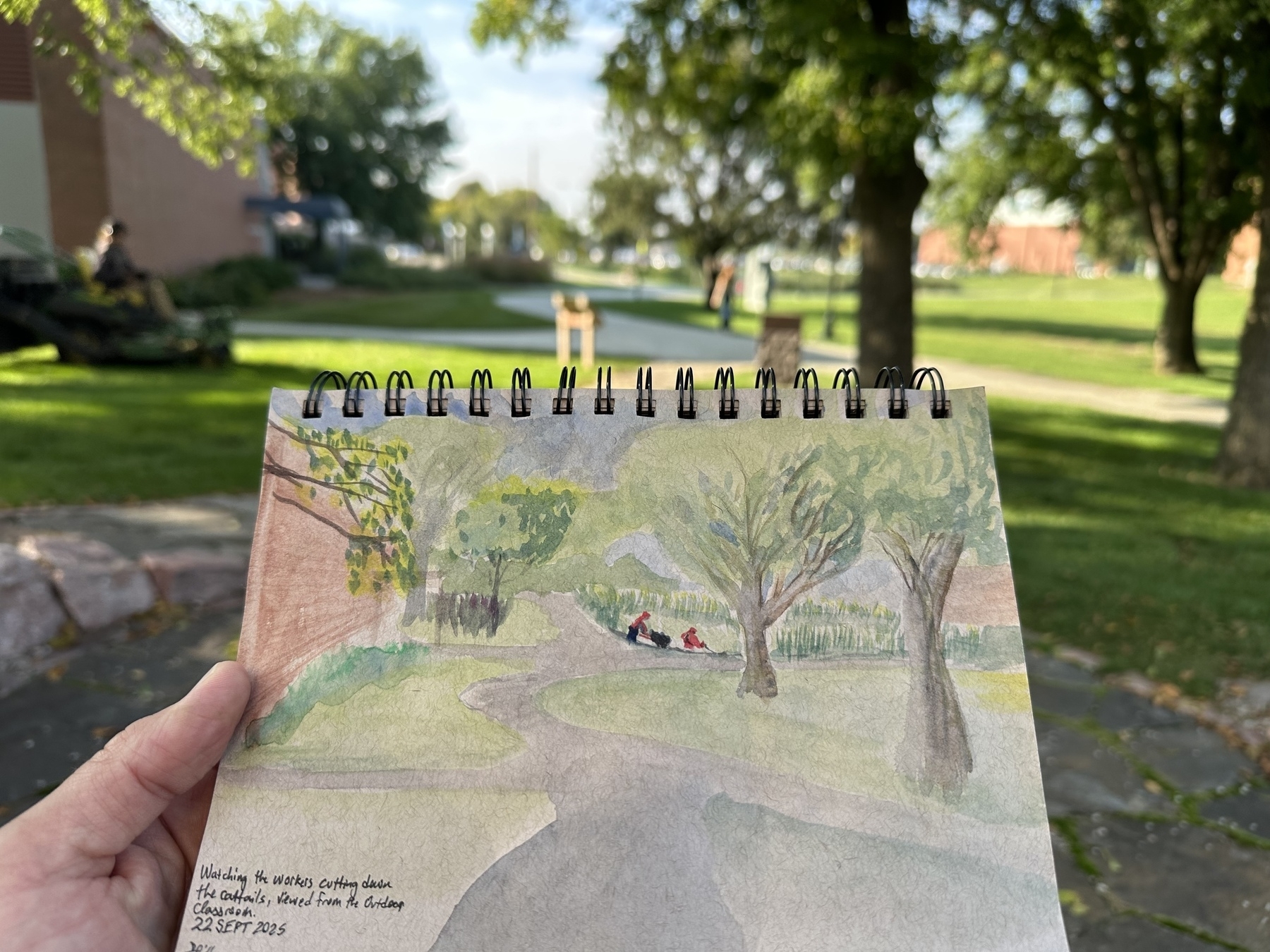
Note for a longer essay:
Students often complain that Plato is annoying and does not give clear doctrines.
Philosophy professors have also long disliked his writing, and sometimes try to distill his real meaning from his dialogues.
But the dialogue is the point.
Jalysus sketch
I see them all over my biennial bee blossom plants, and on the nicotiana rustica as well.
But even when I look for them they’re easy to miss. They blend into the plant, and look almost like flower buds.
They move slowly until they decide to fly, and then — whoosh! They’re gone.
I love their spindly antennas, spider-web thin with tips that look like drops of water.
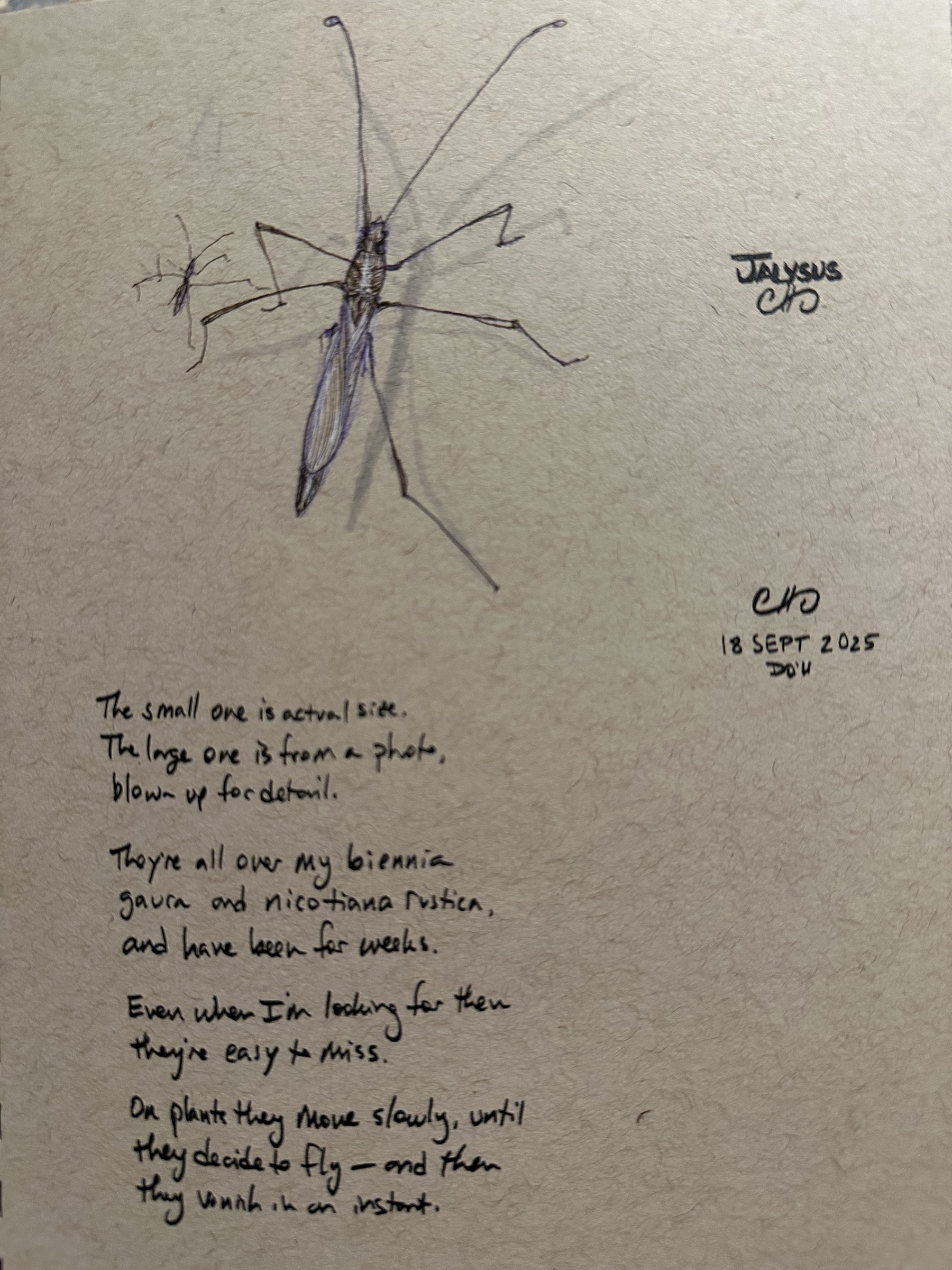
A few native plants in a square-meter garden by the sidewalk have become a roadside banquet in a pollinator food desert. Salvia, monarda, helianthus, aster, ironweed, vervain, silphium, liatris, clover, and a few others.
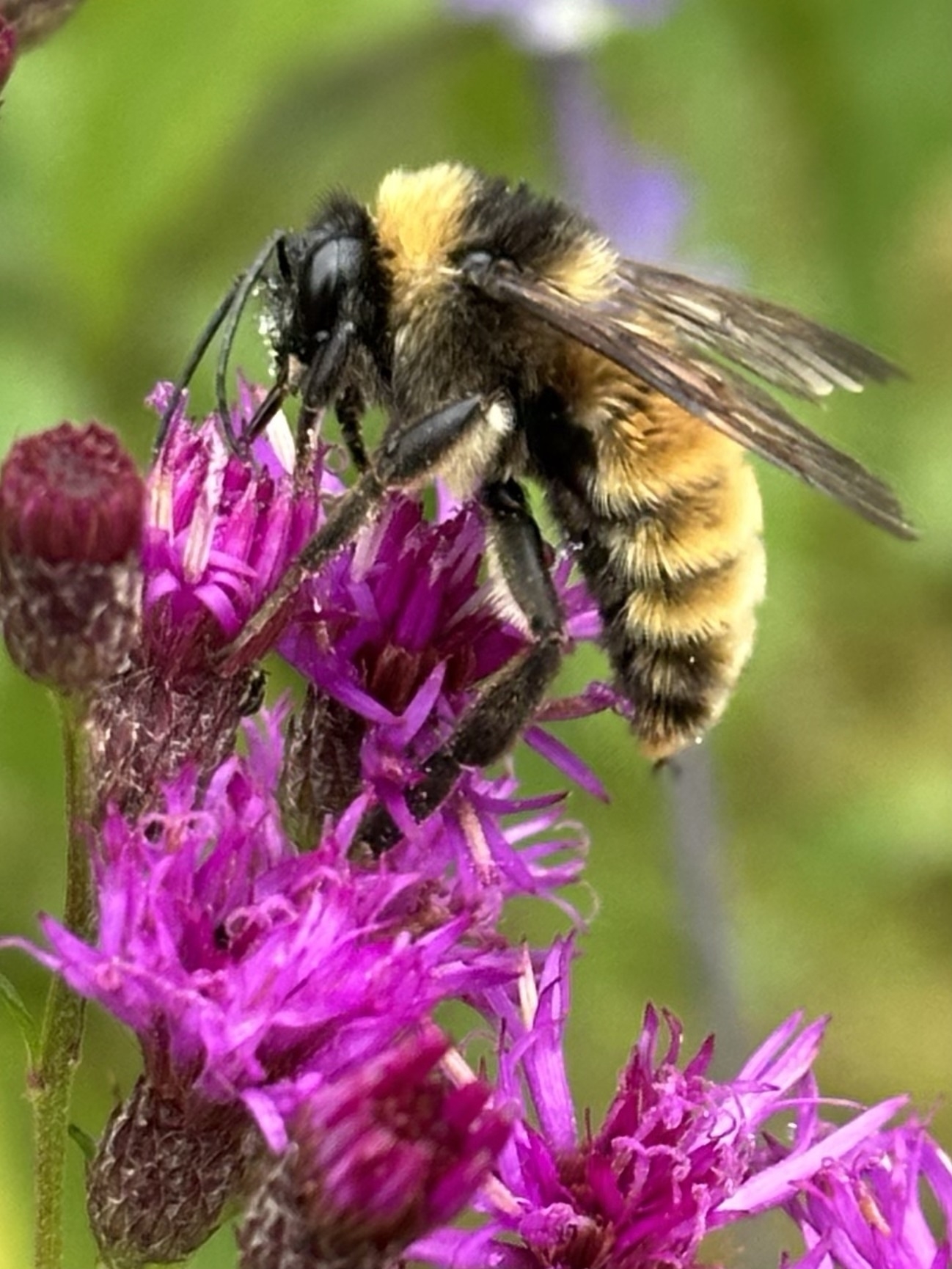
I wish I could assign more books, and that my students and I had more time to sit quietly to discuss them. But I assign a few, and I ask them to read them slowly with me. Their lives increasingly seem to be lives of haste, and care.
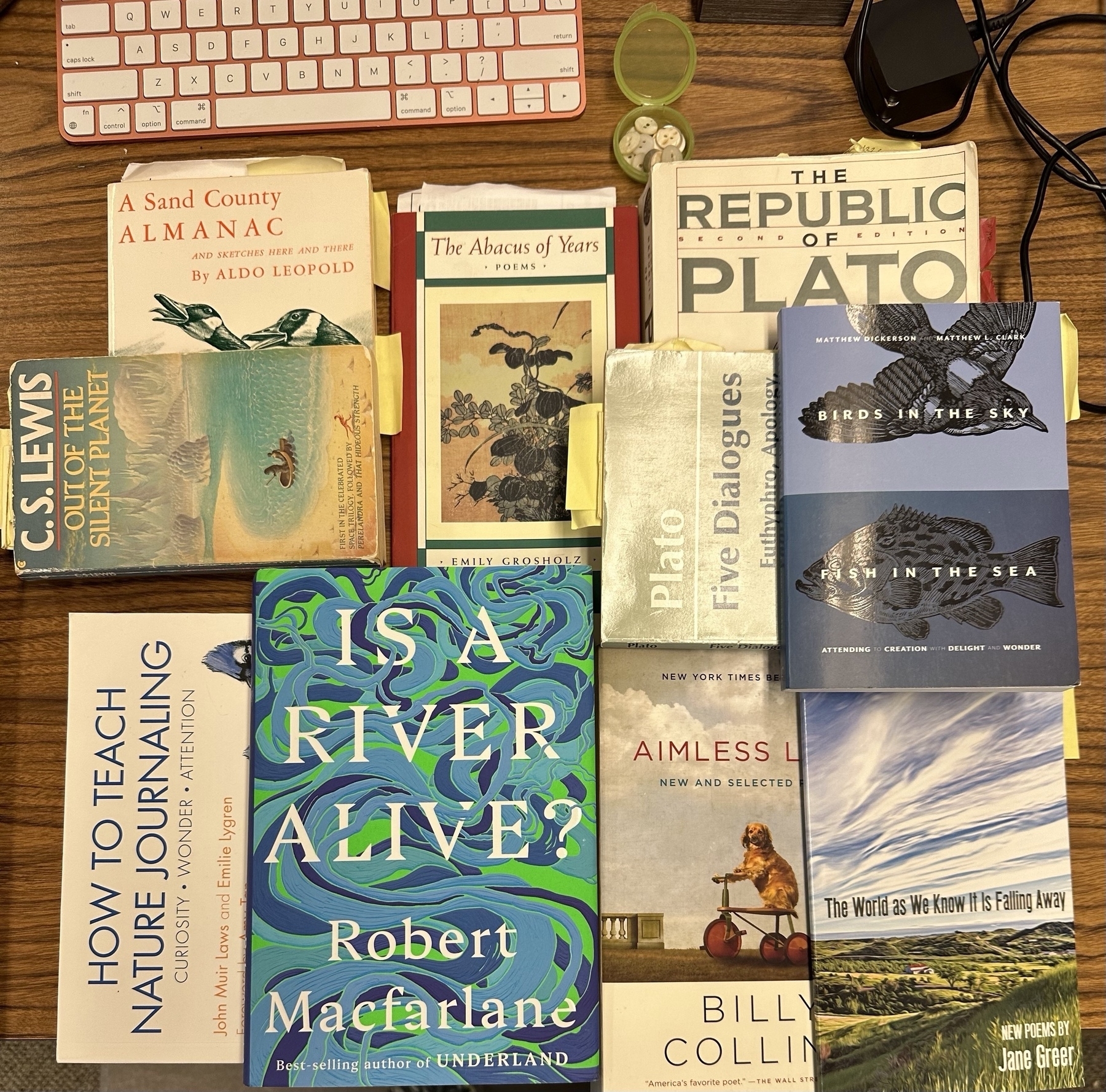
"Measure What Matters"
Not everything needs to be measured. And sometimes the measuring changes the situation. In education when we “teach to the test” or assess the things we can quantify easily, then everything else vanishes from view. Ask any student how they’re doing in school and they’ll answer with a report of their grades. Which does not answer the question. How was that first kiss? That first dance? The sunset over the ocean? The moment of calm? Yes, you can measure parts of them. No, your measurement won’t capture what matters.